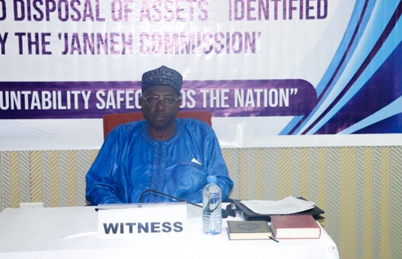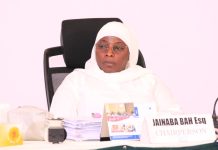By Kebba AF Touray
In a public hearing before the National Assembly’s Special Select Committee on Tuesday, July 29, 2025, Ebrima Cham, Chairman of the Board of the Gambia Livestock Marketing Agency (GLMA), testified on the agency’s role in handling livestock assets formerly owned by ex-President Yahya A.J.J. Jammeh.
The committee is investigating the management and disposal of assets identified by the Janneh Commission as properties of the former president. The Commission, established by the government in 2017, uncovered widespread financial misconduct involving Jammeh and recommended the recovery of his assets, including cattle and other livestock kept at farms in Kanilai, Farato, and Banjulinding. A High Court order issued that same year placed the livestock under the custody of GLMA.
GLMA was created by an Act of the National Assembly in 2008 to promote, regulate, and facilitate livestock marketing in The Gambia. Among its regulatory functions is the registration of livestock dealers, butchers, and vendors.
Cham, who became Deputy Director of the agency in late 2017 following the dismissal of the previous Director General, told the committee that he was aware of the High Court order concerning the livestock: “Yes.”
When asked by Counsel Aji Saine Kah whether he was also aware that the order included the Gambia Livestock Marketing Agency, he responded, “Yes.”
Prior to 2017, Cham said the agency did not maintain any records of the livestock owned by the former president. “Kanilai Family Farms is an autonomous body,” he said, but noted that “because they were receiving frequent requests from the farm,” the agency “decided to assign somebody to the farm to be helping them.”
He said the only record he received was a statistical one provided by Samba John, the outgoing Director General, detailing the inventory of livestock in Kanilai.
Asked when GLMA became aware of the court order, Cham said they received a letter from the Ministry of Agriculture in June 2017. Counsel Kah followed up: “Mr. Cham, when you received this letter in June 2017, what was GLMA’s next course of action after receiving this letter?”
Cham responded: “When we received the letter, we met over it, and discussed as to what are modalities in place in terms of the logistics, security and their TOR in doing taking charge of the livestock, and the CDS should have been informed and the camp commander.”
He confirmed that the agency did not receive a response from the Ministry of Agriculture and admitted they did not take any further steps. “We did not take any initiative whether both officially and unofficially.”
When asked whether they tried to obtain a copy of the High Court order from the Attorney General or the court, Cham said: “No. We did not write to the Attorney General because the line of communication was between us and the ministry and nobody was copying our letter. So, we could not go outside that communication.”
Asked by Counsel Kah: “Did you try to go to the High Court to obtain a copy of this order?” Cham replied: “No.”
Kah asked: “Was that not a little bit concerning to the agency received information about a court order that concerns the agency and livestock of the former president, but the agency decided it had no interest in gathering or obtaining further information with regards to that said order? Was that not of any concern to you?”
Cham said: “No,” and explained, “At the time, they considered that they were not written to by the High Court.”
Asked about the consequences of not adhering to an order of the High Court, Cham said, “The consequences are very serious.”
On the livestock tagging exercise during the Jammeh era, Cham said: “In Kanilai, basically, there were local breeds like Dama and Dama crossbreeds. I cannot remember seeing any sheep or goats in Kanilai. Just cattle. At Farato we saw only cattle and few wolf sheep.”
He added that the exercise lasted five days—three in Kanilai, one in Farato, and one in Banjulinding—and they received the government’s daily subsistence allowance of D650. “We received that payment from the Justice Ministry,” he said.
Asked why the agency eventually complied with the court order after initially failing to do so, Cham said: “We were having concerns such as with logistic, security and when the Lead Counsel of the Commission wrote to me, I also wrote back.”
He added: “The Commission’s Lead Counsel invited me for a discussion, after which he addressed our concerns,” which led to their decision to comply with the order.
Kah put it to him whether the loss of 400 cattle—some reportedly slaughtered by Colonel Jammeh and others stolen—could be attributed to the agency’s inaction. Cham responded: “We wrote to the Agriculture Ministry for clarity, but the Ministry did not respond. So, to shoulder the loss of 400 cattle and those that were theft while we seek clarity is too much for the agency and cannot be attributed to the agency’s inactivity.”
He said that at Farato, the farm manager alleged that most of the large cattle were stolen.
Regarding the valuation exercise, Cham told the committee: “We were blind folded,” adding that the Secretary to the Janneh Commission told them not to keep records of the valuation.
Asked how many people from GLMA participated in the tagging, Cham said: “Myself, Samba John, Sheriff Bah, Samba Sowe, and Buba Korta.”
He continued: “We did not tag all the animals. We did not estimate kilo for a single animal.” He added that they were informed by the Farato farm manager that a person “in the pretext that he is from the state house” would sometimes take away or kill cattle.
On other livestock reportedly owned by Jammeh, Cham said: “Ex-President Jammeh was into everything, there was time he used to keep big rams in State House.” He also said he was told Jammeh had a farm in Siffoe, “but there are no livestock there.”
When asked about livestock showgrounds, Cham said GLMA currently manages one in Abuko. “The one in Farafenni is in dispute and the one in Basse is narrow.”
Counsel Kah referenced a document on the tagging budget and confirmed the names of GLMA officials involved.
Referencing Section 14(f) of the GLMA Act—which mandates the use of livestock weighing scales for pricing—Kah asked why that provision was not applied during valuation. Cham responded: “The use of the scale is not practicable, and as such are making effort to have the section amended.”
On the pricing of livestock, Cham said: “We have not sold any livestock and we have not determine price of any single livestock.”
Asked for his view on the Janneh Commission’s report and the prices attached to the livestock, Cham said: “The report is not incredible, it could be cooked, because it stated things that did not emerge from us.”
The inquiry continues as lawmakers press on with investigations into the management of Jammeh’s assets.



















